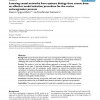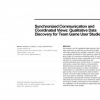125 search results - page 10 / 25 » Causal Discovery as a Game |
BMCBI
2007
13 years 7 months ago
2007
Background: Causal networks based on the vector autoregressive (VAR) process are a promising statistical tool for modeling regulatory interactions in a cell. However, learning the...
ICML
2008
IEEE
14 years 8 months ago
2008
IEEE
We present an algorithm, HI-MAT (Hierarchy Induction via Models And Trajectories), that discovers MAXQ task hierarchies by applying dynamic Bayesian network models to a successful...
HCI
2009
13 years 5 months ago
2009
Games are increasingly being used as educational tools, in part because they are presumed to enhance student motivation. We look at student motivation in games from the viewpoint o...
CHI
2009
ACM
14 years 8 months ago
2009
ACM
We present a tool for qualitative data discovery that aids researchers in analyzing synchronized log data with audio collected from multiple computers. The tool was originally dev...
ATAL
2004
Springer
14 years 24 days ago
2004
Springer
Agent description and discovery (ADD) is a critical infrastructure for open multi-agent services. As multi-agent systems grow larger and more diverse, it becomes harder to locate ...


